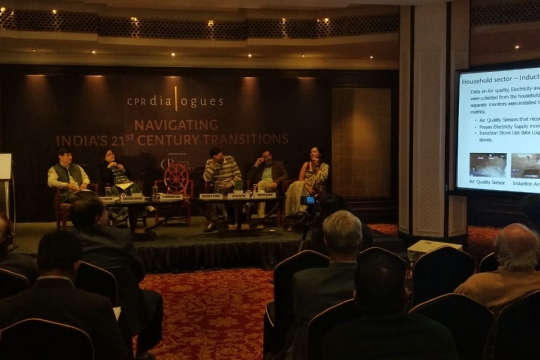The Centre for research on the Economics of Climate, Food, Energy and Environment (CECFEE) and Centre for Policy Research (CPR), Delhi, India conducted a panel session as part of CECFEE’s Policy day event titled ‘Research for Policy Action on Air Pollution’ on 17th December 2018. Given the crisis levels that air pollution has reached in many parts of India, this session was extremely important and relevant. The panelists included Shibani Ghosh, a public interest lawyer and fellow at CPR; Professor E. Somanathan from CECFEE; Ritesh Singh, Joint Secretary at the Ministry of Environment, Forests, and Climate Change (MoEFCC); Nitin Sethi from the Business Standard and Vinuta Gopal from Asar Social Impact Advisors and was chaired by Professor Navroz Dubash of CPR.
Shibani Ghosh spoke about the nature of public messaging that needs to happen in times of air pollution crisis and pointed out why such messaging is necessary, and what such messages may consist of. She suggested a threefold approach towards improving air quality: political parties need to internalize air pollution as a serious issue worth fighting elections over; there is a need to have measurable targets that can be achieved and strengthening of the institutional capacity.
Professor Somanathan presented some of the on-going research by CECFEE researchers on both household and outdoor air pollution. These included a study in rural Uttar Pradesh, India on the impacts of induction stoves on indoor air pollution and health of rural woman. A related study, in rural Madhya Pradesh, India which aims at identifying the impact of providing information about health effects of increasing the use of LPG and decreasing dependence on use of solid fuels.
On the power sector, he quoted a recent study of his that highlighted the costs including social costs of running existing coal plants is higher than setting up and producing energy from renewables even without taking into climate change considerations. India thus needs to quickly move to renewables and needs policies to promote renewable energy. He also spoke about the study on petrol-diesel price wedge and its impact on air pollution. Finally, dealing with the critical issue of crop residue burning, results on a survey about farmer expectations over the ‘Happy Seeder’were presented. Most farmers feel positively about the ‘Happy Seeder’ in terms of its impact on yields, while a substantial fraction appears unhappy with the way it works.
A lively and rich conversation followed where issues like implementation of environmental regulation were discussed. Prof Somanathan believed that an independent regulator with ‘real teeth’ and free of political influence was required. Other panelists were skeptical about the efficacy of such a regulator, especially in India. They believed that a lot more could be done even in the present set up.
Overall, the event was successful in spurring debate and discussion, with several policymakers, researchers, and prominent members of the media and civil society in the audience. The panel concluded that both clear and consistent messaging as well as sound research and analysis are key inputs to policy action. Piecemeal and reactive mitigation measures are certainly not enough and need to be replaced with concrete measures. Any serious plan to mitigate air pollution has to be long-term in nature, target multiple sources, operate year-round, and focus on regions rather than cities.
You can watch the full session here
